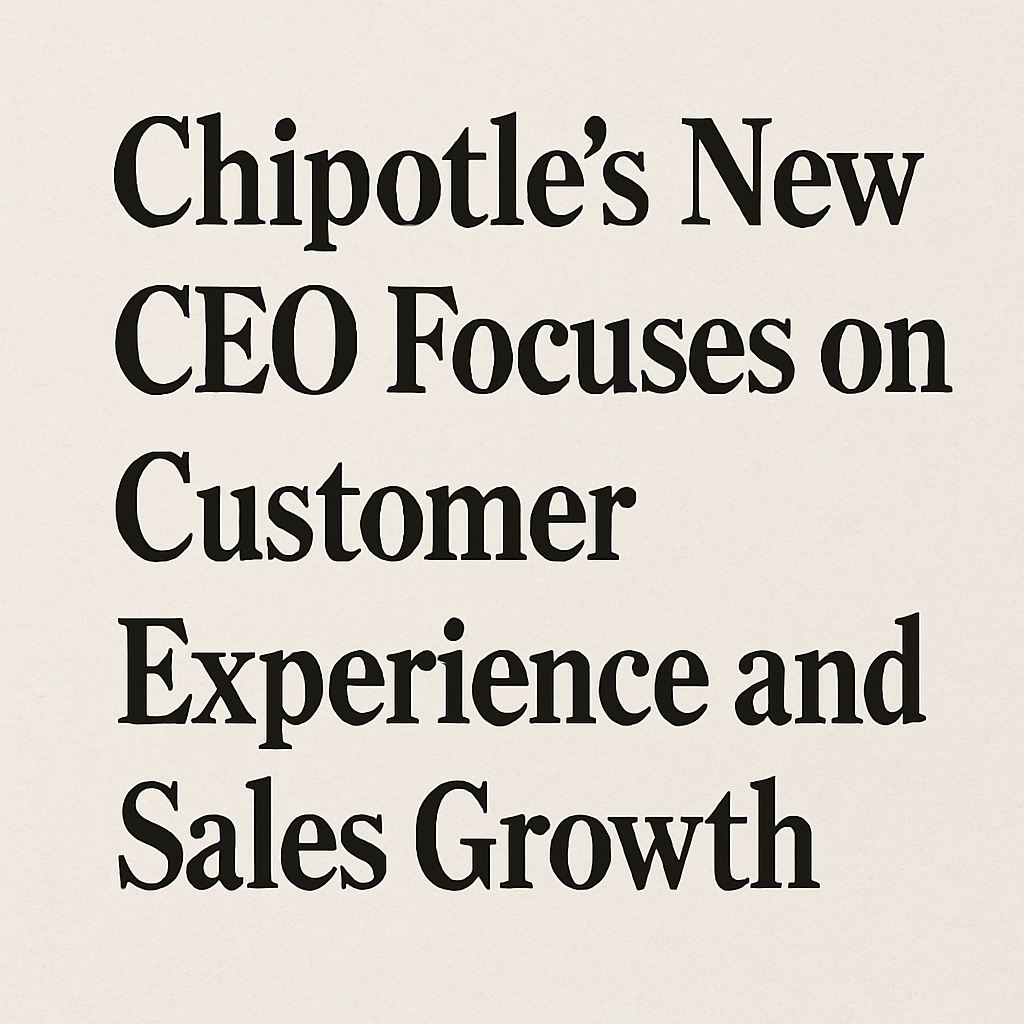Chipotle’s New CEO Focuses on Customer Experience and Sales Growth

When Scott Boatwright ascended to the role of chief executive officer (CEO) at Chipotle Mexican Grill in November 2022, he brought with him nearly a decade of operational expertise, viewing the chain through a lens refined by his previous experiences as Chief Operating Officer (COO). Close collaboration with Chipotle’s founder, Steve Ells, during a pivotal period of recovery following a significant food safety crisis, granted Boatwright valuable insights into the core operational values of Chipotle. Now, as CEO, he is reorienting the company’s focus, identifying a critical element that he believes has been missing—hospitality.
A Shift Towards Hospitality
Under Boatwright’s leadership, the company is shifting its focus from merely efficiency in service to a more balanced approach—one that blends operational excellence with a warm customer experience. Boatwright recalls Ells emphasizing that Chipotle didn’t need to prioritize friendliness; speed was paramount. However, this perception is evolving, as Boatwright aims to reinject an element of warmth into the customer service experience, which he contends is necessary in the competitive landscape of quick-service restaurants (QSR).
In an interview with Fortune, Boatwright articulated this vision, noting, “Our team members got so focused on creating the experience efficiently that they can just forget to smile.” While he does not envision deep, personal interactions, he advocates for basic courtesies, such as welcoming greetings and genuine expressions of appreciation. Such steps are not merely decorative; they aim to cultivate a more inviting atmosphere that aligns with the nature of Chipotle as a hospitality-oriented business.
Competitive Landscape
This adjustment in strategy is particularly critical within the current economic climate where consumer loyalty is increasingly fractured. As Boatwright succinctly put it, “We’re all fighting for market share, we’re all fighting for dollars.” To this end, Chipotle’s approach must combine creative, right-brain initiatives with left-brain analytical skills needed for top-tier operational efficiency. This duality could prove vital as Chipotle looks to establish a more solid foothold in a rapidly shifting market landscape.
International Expansion and New Markets
In conjunction with enhancing customer service, Chipotle is also aggressively pursuing international growth. Notably, the company has proposed opening restaurants in Mexico, a bold venture that has generated a mix of skepticism and optimism among industry analysts. Previous attempts by other American brands to penetrate the Mexican market, such as Taco Bell, have raised doubts about Chipotle’s strategy. Analyst Antonio Hernandez of Actinver Research remarked, “Familiarity with its ingredients does not necessarily predict success.”
However, Chipotle executives counter that the company’s emphasis on high-quality, fresh ingredients distinguishes their offering from other fast-food options. Chief Brand and Marketing Officer Chris Brandt asserts, “We’re not just another American fast-food place that’s coming,” highlighting their plan to cater to a demand for higher-quality, quick-service Mexican-inspired meals.
Expansion Strategy
- **Domestic Growth Potential**: Currently, Chipotle operates approximately 3,500 locations with an average annual sales volume of $3.2 million per store, with CFO Adam Rymer suggesting there is a realistic pathway to reaching $4 million. This is bolstered by plans to identify and penetrate smaller U.S. markets, aiming for cities with populations around 30,000 where competing chains may not be present.
- **Innovative Equipment and Menu Development**: In pursuing operational excellence, Chipotle is focusing on technological upgrades to enhance food preparation and efficiency. Equipment innovations, such as specialized slicers for produce and rapid chopping devices, are intended to reduce service times while maintaining food integrity.
- **Data-Driven Menu Innovations**: Boatwright is also keen on increasing the number of limited-time offerings (LTOs), intending to transition from the current pace of two innovations per year to three. Enhanced analytics capabilities now allow for better prediction of menu item success and failure, a lesson learned from past misfires like the Garlic Guajillo Steak, which struggled to find its audience in 2022.
Maintaining Brand Integrity Amidst Growth
As Chipotle works towards reversing a decline in same-restaurant sales reported last quarter, executives emphasize the importance of brand integrity. With an ambitious financial target of $11.3 billion in revenue for 2024, there is a heightened awareness regarding the strategies utilized to drive this growth. According to CFO Clymer, past experiences have shown that reducing prices does not necessarily lead to increased customer visits or loyalty, particularly in a market where consumers remain steadfastly loyal to certain brand pillars.
Furthermore, executives remain vigilant about the economic conditions that may arise from global trade relationships and international market sentiment, particularly in light of recent geopolitical shifts between the U.S. and its neighbors. However, both early observations and strategic projections indicate that Chipotle could effectively navigate these challenges without diluting its brand identity.
Conclusion
In summary, as Chipotle embarks on this new chapter under Scott Boatwright, the company is positioned to enhance its operational effectiveness while simultaneously nurturing a more personalized customer experience. By employing a combination of data analytics, strategic international partnerships, and a resolute commitment to quality, Chipotle aims to achieve its next milestone of $4 million in annual sales per store. Moving forward, the success of this plan will depend on maintaining the balance between operational robust strategies and the foundational hospitality ethos that defines the Chipotle brand.
Did your workplace make our list of the 100 Best Companies to Work For?
Explore this year’s list.
About the Author
Phil Wahba is a senior writer at Fortune primarily focused on leadership coverage, with a prior focus on retail.